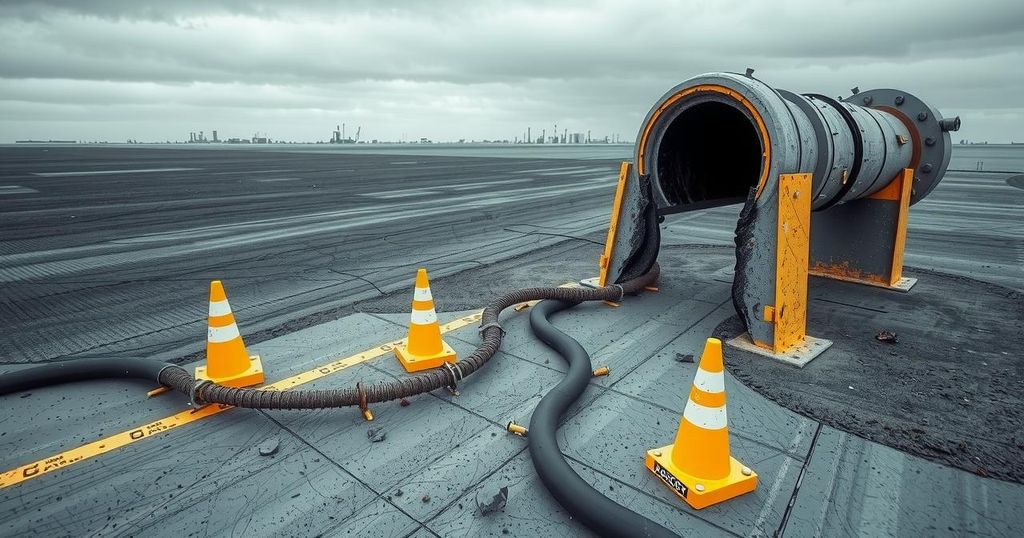Companies
AFRICA, BONNY, BONNY EXPORT TERMINAL, CONSORTIUM, ENERGY, GRACE IRINGE, INVESTIGATION, IRINGE, KO, MINING, NIGER DELTA, NIGERIA, NIGERIAN NATIONAL PETROLEUM COMPANY LIMITED, NNPC, OIL AND GAS, OIL PRODUCTION, POLICE PUBLIC RELATIONS OFFICER, RENAISSANCE GROUP, REUTERS, RIVERS STATE, RIVERS STATE POLICE COMMAND, SHELL PETROLEUM DEVELOPMENT COMPANY, TNP, TONY OKONEDO, TRANS - NIGER, TRANS - NIGER PIPELINE, TRANS NIGER, TV360 NIGERIA
Leila Ramsay
0 Comments
Explosion Disrupts Oil Flow in Nigeria’s Trans-Niger Pipeline; Investigation Initiated
An explosion occurred on the Trans-Niger Pipeline in Rivers State, Nigeria, disrupting oil transport and prompting an investigation. The pipeline, vital for crude oil transport, has a capacity of over 450,000 barrels per day. Authorities reported arrests and are considering causes such as sabotage or equipment failure. The incident adds to ongoing challenges facing Nigeria’s oil infrastructure.
On Monday night, the Trans-Niger Pipeline, a vital oil conduit in Nigeria, experienced an explosion, leading to significant disruptions in oil flow and prompting immediate inquiries, as reported by local authorities on Tuesday. Witnesses described a loud blast followed by an intense heat and flames, with thick smoke visible for miles across the landscape.
The Trans-Niger Pipeline (TNP), managed by the Shell Petroleum Development Company alongside the Nigerian National Petroleum Company Limited (NNPC), is crucial for transporting crude oil in the Niger Delta region. The pipeline extends approximately 180 kilometers (112 miles) and has the capacity to move over 450,000 barrels of crude oil daily to the Bonny Export Terminal, among others.
Renaissance Group, the oil consortium responsible for the TNP, acknowledged the explosion and disclosed that a joint investigation team has been deployed to the scene, as stated by spokesperson Tony Okonedo to Reuters. In addition, the Rivers State Police Command reported the detention of two individuals connected to the incident.
Police Public Relations Officer SP Grace Iringe-Koko confirmed that a comprehensive investigation aimed at identifying the explosion’s cause has commenced. According to a report by TV360 Nigeria, the fire resulting from the explosion, which ignited in a mangrove area, has been extinguished to prevent further environmental harm.
While investigators are examining potential causes, there is speculation that the explosion may be attributed to sabotage, vandalism, or equipment failure. This latest incident exacerbates ongoing issues related to Nigeria’s oil infrastructure, which is already burdened by political and economic tensions. As of now, officials have not provided specific details regarding the explosion’s damage or its ramifications for oil production.
In conclusion, the recent explosion of the Trans-Niger Pipeline has triggered an investigation and raised concerns related to Nigeria’s oil infrastructure. The event underscores persistent challenges faced by the country’s oil sector, including potential sabotage and vandalism, following a series of similar incidents. The exact cause of the explosion remains undetermined, with authorities taking steps to ensure environmental safety and maintain production.
Original Source: www.pipeline-journal.net




Post Comment